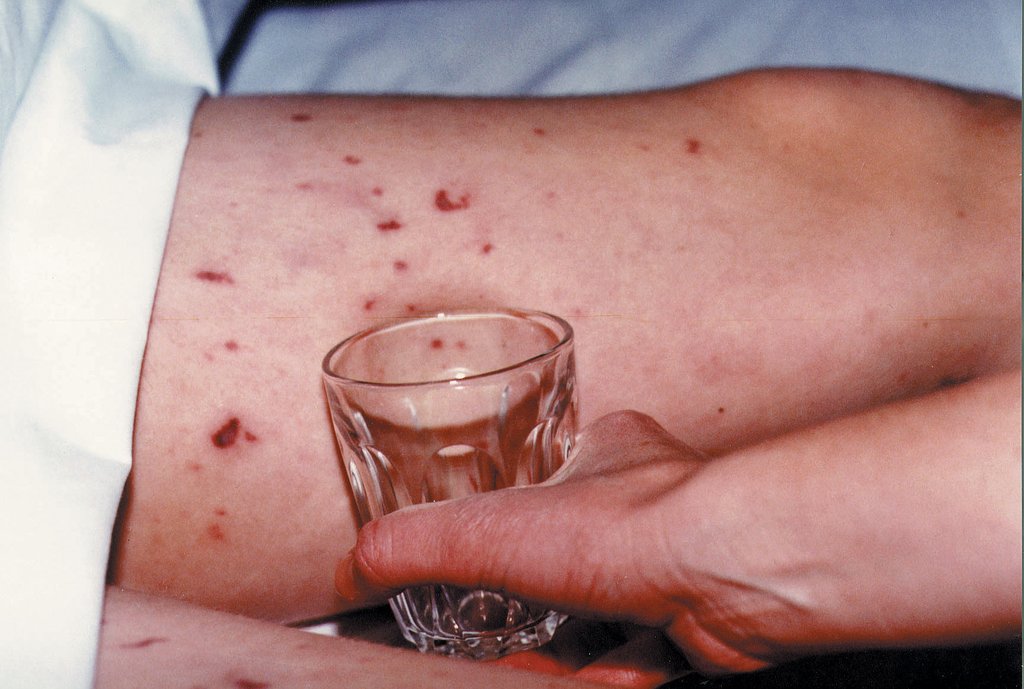
Meningococcal rash test: the spots remain visible when pressed under glass. Photo: Meningococcal Now.
A teenage girl has died after being hospitalised with meningococcal in Canberra.
The 18-year-old from Ulladulla, whom Region has chosen not to identify, attended the Spilt Milk festival two weekends ago (26 November), which resulted in the issuing of a public health alert for the potentially deadly disease.
Meningitis Centre Australia confirmed the girl’s death in a post on their Facebook page.
“An 18-year-old female from the South Coast of NSW who attended the Spilt Milk Festival has sadly passed away from meningococcal,” it read.
“Our thoughts are very much with the family and friends at this time.”
ACT Health also extended its condolences to the young girl’s family and friends.
A spokesperson also urged anyone who attended the Spilt Milk festival on Saturday, 26 November, to be alert for symptoms of meningococcal and to “act immediately” if they appeared.
“It is not known where the case acquired their infection, however, they had attended the Spilt Milk festival in the week prior to becoming unwell,” they said.
“Any close contacts who are at higher risk have been identified and contacted directly.”
Meanwhile, a NSW Education spokesperson said everyone was “deeply saddened” by her tragic death.
“Our sincere condolences and deepest sympathies are with her family and the broader school community [where she recently graduated],” they said.
“Additional counselling and wellbeing support for all students and staff affected will be provided during this difficult time.”
Her death marks the third NSW fatality due to the disease this year.
NSW Health issued an alert stating there have been 29 cases reported in the state this year.
“Meningococcal disease is a rare, but serious and sometimes fatal infection,” it stated.
“The majority of cases have been due to meningococcal B strain of the infection.”
NSW Health reminded people while vaccination meant the disease was more “uncommon”, it could occur all year round, and increases were usually seen in late winter and early spring.
“We have seen a slight increase in cases in recent weeks, compared with the same period over the previous five years,” the statement said.
“There are different strains of infection, and the disease can occur in people even if they have been vaccinated.”
Executive Director of Health Protection NSW Dr Jeremy McAnulty said early intervention could be lifesaving.
“Meningococcal disease symptoms can appear suddenly and become very serious very quickly,” he said.
“I urge everyone not to discount symptoms when they appear or assume it may be just a mild infection. If you suspect meningococcal disease, don’t wait for the rash – see a doctor immediately.”
Meningococcal disease can be fatal within hours if left untreated.
Children under five and 15 to 25-year-olds are at the greatest risk of contracting the disease.
“While it is a well-known symptom of meningococcal disease, the rash does not always occur or may present late in the illness,” Dr McAnulty said.
“If symptoms rapidly worsen, or if your child is very unwell, call Triple Zero (000) or go straight to your nearest emergency department.”
Knowing the symptoms could help prevent premature death or life-long disability.
They include:
- Severe, unexplained limb pain
- Difficulty waking up
- High-pitched crying in babies
- Severe headache
- Upset by bright lights
- Stiff neck
- Red-purple rash which doesn’t disappear when pressed with a glass.
Under the National Immunisation Program, the meningococcal ACWY (Men ACWY) vaccine is free for babies at 12 months, adolescents, and people of all ages with certain medical conditions.
In NSW and the ACT, the adolescent dose is delivered through the school vaccination program in Year 10.
As of 1 July 2020, Aboriginal children up to the age of two and people with certain medical conditions can also access the meningococcal B (Men B) vaccine free of charge.
All children from six weeks of age can have the Men B vaccine to reduce the risk of infection.
Meningococcal is not easily spread and usually requires close, prolonged contact, such as intimate kissing, but it can be spread by sharing drinks, food or cigarettes.
More information about the disease can be found here.
Original Article published by Claire Fenwicke on Riotact.




